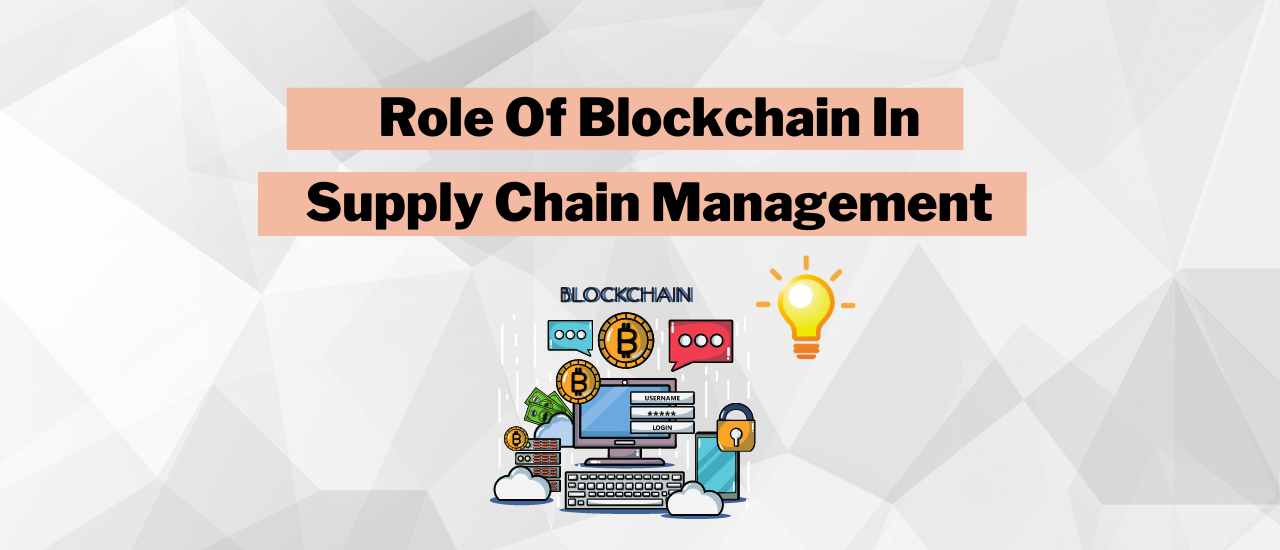
Role Of Blockchain For Supply Chain Management
The supply chain is indeed a complicated network comprising various parties, countless transactions, and massive data volumes. Businesses face major challenges due to inefficiencies, a lack of transparency, and rising counterfeiting and fraud situations. Thus, blockchain technology holds the potential to revolutionize supply chain management.
Role of Blockchain For Supply Chain Management
We have often observed the use cases of blockchain technology in the service industry, but its potential in the manufacturing industry is still largely unexplored. One such area is supply chain management where blockchain technology adds immense value and helps to streamline the overall operations. Some of the key benefits of blockchain technology in supply chain management are as follows –
Enhanced Transparency and Traceability
It is a transparent and unchangeable database that records all transactions and product movement in real time. With the openness of blockchain technology stakeholders can track and trace products from their point of origin to their final destination. In this case, blockchain generates a permanent and tamper-proof record, safeguarding the data's integrity and legitimacy. This improved transparency and traceability aids in the prevention of counterfeiting, improve logistics, and allows for more expedient recalls in the event of product faults.
Improved Supply Chain Efficiency
Manual activities, documentation, and complicated reconciliations are common in traditional supply chain procedures. By automating procedures and removing intermediaries, blockchain technology speeds up these processes. Smart contracts, which are self-executing contracts based on established criteria, allow for the automation of different supply chain processes such as payment settlements, inventory management, and quality control. These automated procedures eliminate human error, improve operational efficiency, and eventually optimize the supply chain as a whole.
Elimination of Intermediaries
Intermediaries like brokers, auditors, and third-party verifiers are no longer required thanks to blockchain. Businesses may directly communicate and transact with one another by exploiting blockchain's decentralized design and consensus processes, cutting costs and removing delays imposed by middlemen. This peer-to-peer model also improves trust and security in supply chain transactions since participants may independently evaluate and confirm each other's actions.
Enhanced Security and Data Integrity
The communication of sensitive data across many parties is part of supply chain management. Data leaks and manipulation are common in traditional databases. Blockchain technology overcomes these problems by securing data with cryptographic methods and consensus procedures. Each transaction on the blockchain is encrypted, timestamped, and connected to the preceding transaction, resulting in an immutable chain of data. This strong security structure protects data, decreases the cance of fraud, and fosters trust among supply chain partners.
Efficient Inventory Management
Inventory control is essential in supply chain operations. Inventory levels, location, and movement can all be tracked in real-time thanks to blockchain. Businesses may precisely manage inventories and avoid stockouts or overstocking by recording each transaction and transfer of items on the blockchain. Increased inventory visibility and automation cut costs, enhanced demand forecasts, and enable more effective replenishment procedures.
Streamlined Supplier Management
Managing a supplier network entails confirming credentials, maintaining compliance, and tracking performance. By offering a decentralized and secure platform for storing and validating supplier data, blockchain simplifies supplier management. Supplier onboarding, qualification processes, and contract administration may all be automated with smart contracts. This simplified strategy minimizes administrative costs, promotes confidence in supplier relationships, and improves supply chain collaboration.
Efficient Dispute Resolution
Supply chain transactions are rife with disputes and controversies. Long legal processes and third-party interventions are frequently used to resolve these issues. Smart contracts based on blockchain technology provide a transparent and automated way to dispute settlement. Smart contracts can have predetermined dispute resolution processes that allow parties to resolve conflicts quickly and effectively without resorting to costly litigation.
Sustainability and Ethical Sourcing
Consumers are becoming increasingly concerned about environmental sustainability and ethical sourcing practices. Blockchain technology may help firms trace and verify the provenance of raw materials, components, and completed goods, facilitating transparent supply chain practices. Companies may give verifiable proof of sustainable and ethical sourcing by recording this information on the blockchain, therefore increasing confidence and matching customer expectations.
Collaboration and Trust in the Ecosystem
Blockchain technology encourages supply chain partners to collaborate and trust one another. Businesses may promote deeper relationships, expedite communication, and create a more coherent ecosystem by exchanging information on a distributed ledger. Increased trust among stakeholders leads to better collaboration, less friction, and the capacity to respond quickly to supply chain changes and interruptions.
Final Words
From enhanced visibility into inventory and automated processes to secure data management and streamlined supplier relationships, blockchain offers a range of benefits to businesses operating in complex supply chains. A blockchain development agency www.esrotlabs.com is the right choice for redefining the supply chain for your business.
